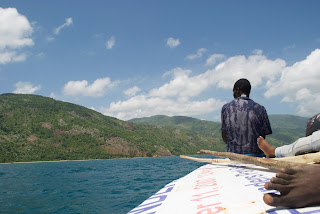I lie on my bed and stare at the ceiling. I remember doing this six months ago,
during my first week here. I was
having trouble getting my legs to move, putting my feet in my shoes and forcing
my body from the secluded haven of this room and into Haiti. I was confused by a nightmare brought
on by my anti-malaria medication, or was it the nightmare of the reality of “25
weeks alone in Haiti” coming crashing down on my bed, leaving a cold, empty pit
in my stomach? I was annoyed that
I had just been woken up at 5:00 for family prayer, which would be in a
language where I didn’t yet understand 10 words. I didn’t want to face the hours of emptiness that was my
internship. I didn’t want to get
up.
I lie on my bed and stare at the ceiling. I remember picturing it coming crashing
down on me, the roof that had sheltered and protected me crushing my legs, my
rib cage and my skull. I thought
about the stories I had heard of the 2010 earthquake in the south of the
country, stories of people being pinned under concrete roofs like mine for days
as they waited for rescue or death.
I reflected on the fact that concrete roofs like mine are ideal for
beating the heat and hurricanes common to Haiti, but proved deadly when the
earthquake came.
I lie on my bed and stare at the ceiling. I did this back in July and September,
thinking about how good it was going to be to see Abbie and Ryan. I took a break from reading my book to
savor the thoughts about how relieving it would be to discuss all these
thoughts I had been thinking with someone familiar with my language, culture
and personal history. After
feeling unknown and misunderstood for weeks, I laid in bed thinking about what
we would talk about and how cathartic it would be.
I lie on my bed and stare at the ceiling. It was here that I weighed the pros and
cons of going outside to Rose Lourdes’ house to play with the kids there and
the work on my Creole. The pros: I
would be engaging (HNGR recommendation #1) the culture I had chosen to be a
part of, working on what could eventually be fulfilling relationships and
leaving my room might temporarily relieve me of my constant loneliness. The cons: I would almost definitely
make a fool of myself culturally or linguistically, I might walk into an
awkward situation that would only heighten my feelings of isolation or the
presence of a blan at their house
might just start to be getting on their nerves. 50% of the time I chose to go; 50% of the time I chose to
continue staring at my ceiling.
I lie on my bed and stare at the ceiling. I think about Monday, giving my last
test, grading the ones I have already given, giving my last English
lesson. I think about Tuesday,
entering final grades, hanging out one last night with the Hamiltons. I think about Wednesday, saying goodbye
to the Hamiltons as they really get started on their work here in Haiti just as
mine is ending. I think about
Thursday, the last day that I’ll have in Haut-Limbé, the last chance I’ll have
to play with the neighborhood kids, my last Creole lesson with Budry. But mostly I think about Friday,
sitting in an airplane, twisting my neck to get one last lasting view of
Haiti. It is bittersweet to think
how much I’ll miss this place. I
never would have thought that I would be lying on my bed thinking, “I don’t
want to leave.”
But that does not mean I’m coming home in despair. Just like when I was preparing to come
to Haiti, there were things I was dreading, but mostly things I was looking
forward to. I don’t want to dwell
on the fact that I don’t want to leave for any other reason than in joy of the
change God has worked in me these last six months. In that joy I can confidently say that there is no reason
for God to stop transforming me when I get back to the US. I anticipate similar (yet opposite) reflections
to the ones above when I am staring at an American ceiling, and for me, that
simply means more opportunity for growth.











